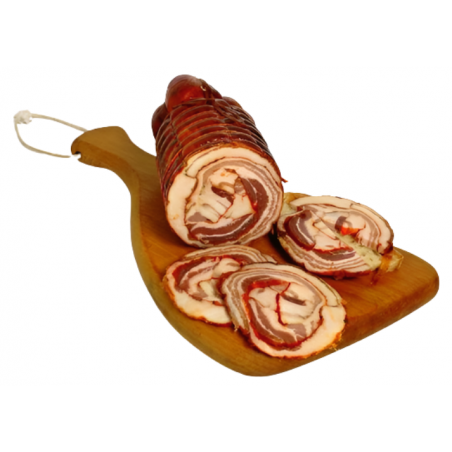

Spicy rolled pancetta is a typical Calabrian cured meat obtained from pork.
The pancetta is processed with natural methods to become one of the most delicious and sought after typical products of Calabrian cuisine,
the seasoning is short so that its softness remains intact, not making it so excessively salty.
continue reading
Since it comes from very heavy pigs, it will be difficult to find a piece under 1.6 kg.
Spicy rolled pancetta is a typical Italian cured meat, with ripe meat, intense aroma and delicate flavor, the darker color of some pieces indicates that they come from organic and / or outdoor farms.
The first written records of its production date back to the early eighteenth century. Some studies, however, have hypothesized that the processing of pigs in Calabria was already taking place during the Magno-Greco period.
Consequently, considering the spread throughout southern Italy of the rite of pork processing, we can say that the Spicy Rolled Pancetta is a millenary tradition.
Each batch of Pancetta Piccante has a different seasoning to ensure precise one-to-one control and guaranteed packaging after maturation.
Maturation, which never falls below three and a half months, and which for larger pieces can even reach five.
Normally it is prepared in the elastic net, but also fenced with the reeds and tied with the elastic string. To enrich the whole, a blend of unique spices, such as black pepper and Calabrian organic hot pepper.
The advent of plastic, relatively recently, has replaced, in domestic processing, the binding with natural reeds, introducing the use of a tubular funnel useful for forming and facilitating bagging and binding.
Currently, the Spicy Bacon is still very present on local tables, and its production is renewed every year, as a ritual, particularly in the period from December to February.
Inside it preserves all the mastery and experience of centuries-long domestic preparation linked to the territory.